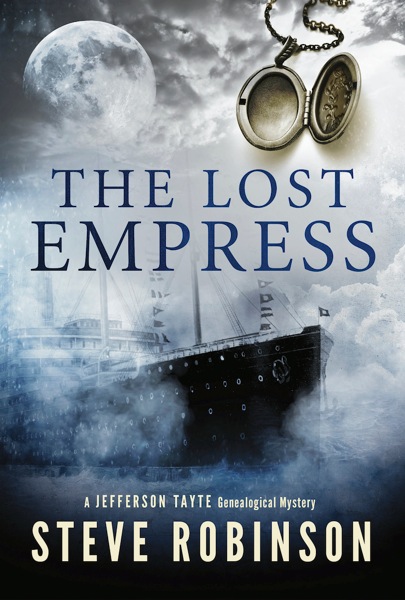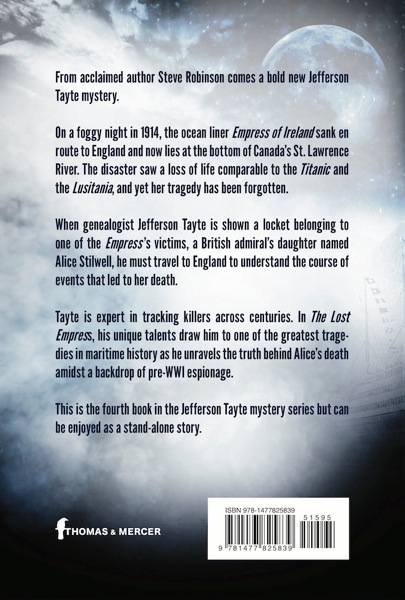Exclusive Interview with Steve Robinson, Best-Selling Author of the Jefferson Tayte Genealogical Mystery Series

There’s nothing quite like a good book to fill the hours of a long holiday weekend. Make that a good genealogy mystery, and it’s even better. Join me for a chat with Amazon author Steve Robinson talking about The Lost Empress, his newest addition to the Jefferson Tayte Genealogical Mystery Series
.
If you’ve never read about Robinson’s family history sleuth, get ready to meet a quirky and interesting character who might remind you of a few genealogists you know. Tayte is a friendly, accomplished, professional American genealogist with a yearning to discover his own past. Blocked by brick walls to his own family history, J.T. unravels the secrets of other people’s family stories instead. In The Lost Empress, J.T. returns to England looking for clues to to a survivor from The Empress of Ireland’s tragic sinking in 1914. He finds espionage, twisted tales, and family secrets — all the ingredients for a good book on a long winter evening.

Denise: The Lost Empress includes so much historical detail that it’s obvious you spent a good deal of time researching the ship and the aftermath of her tragic sinking. How long did the actual research require to make you feel grounded in the story? And was Alice modeled after any actual passenger?
Steve: I do spend a lot of time on research. It’s actually a big part of what I love about my writing. I find the historical research particularly fascinating and The Lost Empress was no exception. As I read about the tragic loss of the Empress of Ireland I honestly couldn’t believe that I’d never heard of the ship before – and yet the loss of life is comparable to the sinking of the Titanic and the Lusitania that same decade. Perhaps it’s for that reason that I felt particularly drawn to my research into the ship and the passengers aboard that fateful journey. I would strongly encourage everyone to find out more about the Empress of Ireland, and to share her story with others so that she might better be remembered.
I also had to learn about life in post Edwardian times, of course, and I’ve tried to convey a sense of the time as much through the subtle nuances of the language as well as the everyday objects that help to describe the time. I love the idea of a penny lick – eating ice cream from a glass dish. Yum! As my lead character from the past, Alice Stilwell, was an admiral’s daughter, a great deal of naval research was also required, particularly concerning Chatham’s former royal dockyard and the naval warships of the time, which I found fascinating.
On the whole I’d say that my research takes about a quarter, or perhaps even a third, of the time that it takes me to write a book. Alice is entirely fictional, although some of the incidents and actions aboard the ship in her last moments are drawn from real events and characters.
About Alice…
Denise: The story is set at the eve of the Great War, when women’s roles were still mostly defined by the men in their lives — fathers, brothers, husbands. Alice Stillwell is aptly drawn, but was it difficult to put yourself into a mindset so different from 21st century sensibilities? Her character is very different from the strong female roles in your previous books.
Steve: Male dominance in Britain was very much on my mind when I imagined the life of Alice Stilwell. Women had no right to vote back then of course, and their place was seen as strictly in the home. It’s hard to imagine nowadays that this was only a hundred years ago. Equipped with that mindset, I wouldn’t say it was too difficult to portray Alice as a typical, if somewhat privileged, woman of her time. I felt that her strength should come from within, rather than being overt, so I’ve not drawn her as such a strong character on the outside, perhaps. But what she goes through demands great strength of character nonetheless and it is through her resolve to protect the people closest to her that drives her on to the story’s conclusion.
Denise: Alice was well balanced by the other female lead, JT’s new British genealogy lady friend. And I loved the genealogical clues you put right out there in front of our nose! Do you think you are becoming more of a genealogist as you work in this genre with JT?
Steve: I hope so, and I do believe that I am. I put as much research into the genealogical aspect of my stories as I do for the historical sections. Essentially I have to set JT brick wall after brick wall, and then I have to help him to break them down, even though I rarely know the solution when that wall goes up. Working through the genealogy myself, and making sure it all stacks up, can take a lot of time and I learn a great deal each and every time I tackle something new. I really love old newspapers, which can help as much with my historical research as they can for the genealogy. Bringing crime fiction to genealogy means that my genealogical research isn’t always so much about family relationships either, but the family members lives, and very often the crimes they are either perpetrating, or are otherwise caught up in. The thing that strikes me most about genealogy is that it’s so diverse. All past documents are records or clues to our ancestors lives. It’s no wonder that the puzzle is often so difficult to piece together.
Is DNA in J.T.’s Future?
Denise: Your website mentions the next mystery in the series. Can you say what form of genealogical research might be involved? Will JT be working with DNA next?
Steve: I’m sure DNA will feature in the series at some point, and there might well be a place for it in book 5. JT’s next mystery will largely focus on finding someone in a foreign land. That’s very cryptic, I know, but I find it difficult to talk about a new book without giving things away, and I do like to keep things close to my chest, at least until the first draft is written. I will say that I’m having quite a time translating records written in languages foreign to my own at the moment, which is an a entirely new challenge for me. Perhaps you could ask me again closer to the release date and I’ll tell you how I got on.





